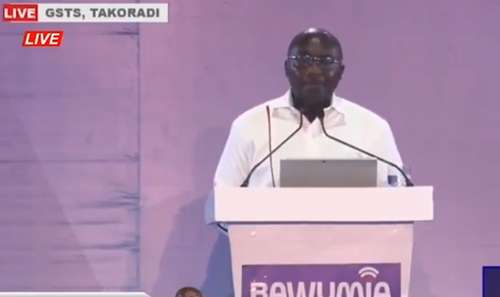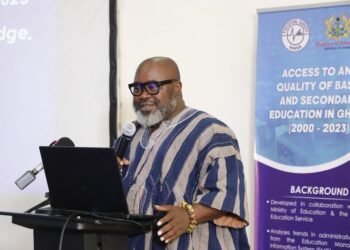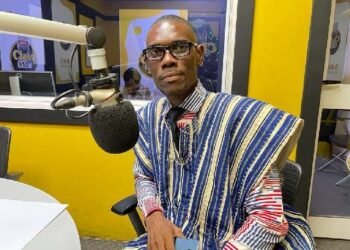At the launch of the New Patriotic Party’s (NPP) 2024 manifesto, Vice President Dr Mahamudu Bawumia, and the party’s flagbearer, laid out an ambitious vision to transform Ghana into a world-class digital economy.
With a focus on leveraging technology, data, and systems, Dr. Bawumia articulated a comprehensive strategy aimed at positioning Ghana as a leader in the Fourth Industrial Revolution and maximizing the benefits of its natural resources.
Dr. Bawumia outlined a bold plan to achieve over 90% internet penetration within the first four years of his administration, a significant leap from the current 70%, up from just 34% in 2016.
“We have already made very significant progress in this direction by increasing internet penetration from 34% in 2016 to some 70% by 2023. Then that task in the next 4 years is to move from 70% to over 90% as exist in the advanced countries.
“It is possible. I am determined to not let Ghana miss out on the 4th industrial revolution as our continent did on the Industrial Revolution some centuries back. I want to see Ghana build the digital talent we require for the 4th industrial revolution”.
Dr Mahamudu Bawumia, Vice President of Ghana and NPP Flagbearer
To bridge the digital divide, Dr. Bawumia promised to provide digital software skills to tens of thousands of youth, including school dropouts, to create jobs and foster innovation.
In collaboration with the private sector, his administration would train at least one million youth in IT skills, including software development, to tap into global job markets.
The Vice President also announced plans to enhance technical and vocational education, with a particular emphasis on STEM (Science, Technology, Engineering, and Mathematics), robotics, and artificial intelligence.
“My government will make coding and robotics standard in senior high schools,” he asserted, signalling a shift towards a more technology-focused educational system designed to prepare Ghanaian students for the future job market.
Expanding Ghana’s Tech Ecosystem
Dr. Bawumia further highlighted the need for increased investment in Ghana’s telecommunications industry, acknowledging that the cost of data remains prohibitively high for many Ghanaians.
He committed to working with industry players to set clear policy guidelines that would remove investor uncertainties and make business planning easier, including the expeditious allocation of spectrum.
A key component of his vision is the establishment of a national robotics engineering and AI lab in collaboration with educational institutions and global tech firms.
This facility, he noted would focus on research and training, aiming to develop a new generation of Ghanaian tech talent.
Additionally, Dr Bawumia noted a $100 million fintech fund would be established to support Ghanaian startups in the payments and financial services sectors, positioning Ghana as a hub for regional fintech innovation.
“We will also be providing venture capital funding and grant support for commercially valuable, viable tech projects by Ghanaian startups to drive innovation, foster high-tech entrepreneurship, create jobs, and support the growth of Ghanaian high-tech businesses world.
“We are also very excited about the opportunities to make sure that large tech firms work on government tech projects to help startups test their ideas in real-world environments and to accelerate their product development cycle”.
Dr Mahamudu Bawumia, Vice President of Ghana and NPP Flagbearer
Advancing Digital Governance and Financial Inclusion
In a move to streamline public sector services, Dr Bawumia promised to implement comprehensive data interoperability across government platforms, enhancing transparency and efficiency.
He also committed to abolishing the unpopular electronic levy (e-levy) and taxes on mobile phones, arguing that these measures would further bolster Ghana’s digital economy.
A particularly innovative proposal was the introduction of a “digital residency” or e-residency program, allowing businesses and individuals in tech firms to register and operate within Ghana, even if they are physically located elsewhere.
According to the NPP flagbearer this, coupled with a five-year digital nomad visa and work permit, aims to attract global tech talent to live and work in Ghana.
“Ladies and gentlemen, we’ll also be implementing comprehensive data interoperability across government platforms to enhance transparency and streamline services. We will be pushing further Ghana’s leadership role in achieving cross-border mobile money interoperability among other payment systems within the AFCFTA to enhance buying and selling within Africa’s 1.4 1,000,000,000 consumer market”.
Dr Mahamudu Bawumia, Vice President of Ghana and NPP Flagbearer
Maximizing Natural Resource Benefits
Turning to Ghana’s rich natural resources, Dr. Bawumia outlined a new paradigm for resource management, focused on value addition and increasing Ghanaian ownership.
He promised to usher in a “golden age” for the country’s natural resources, with policies aimed at formalizing, regularizing, and regulating environmentally sustainable small-scale mining.
” Some of the key policies that we will implement to maximize our benefits from our natural resources include formalizing and regularizing and regulating environmentally sustainable small scale mining. Our goal would be to help grow small-scale mining companies into large-scale mining companies with the capacity to build and assist them to access financing to acquire equipment”
Dr Mahamudu Bawumia, Vice President of Ghana and NPP Flagbearer
He also announced plans to open new community mining schemes and set up state-of-the-art gold processing units in collaboration with the private sector, ensuring that the benefits of Ghana’s mineral wealth are maximized for the country’s development.
Dr. Bawumia’s manifesto launch was a sweeping vision of a technologically advanced, economically inclusive, and resource-rich Ghana.
His proposals, if implemented, promise to transform the country’s economy and position it as a leader in digital innovation and resource management in Africa.
READ ALSO: Oheneni Adazoa Shares Reason Why She Dropped Out of School




















